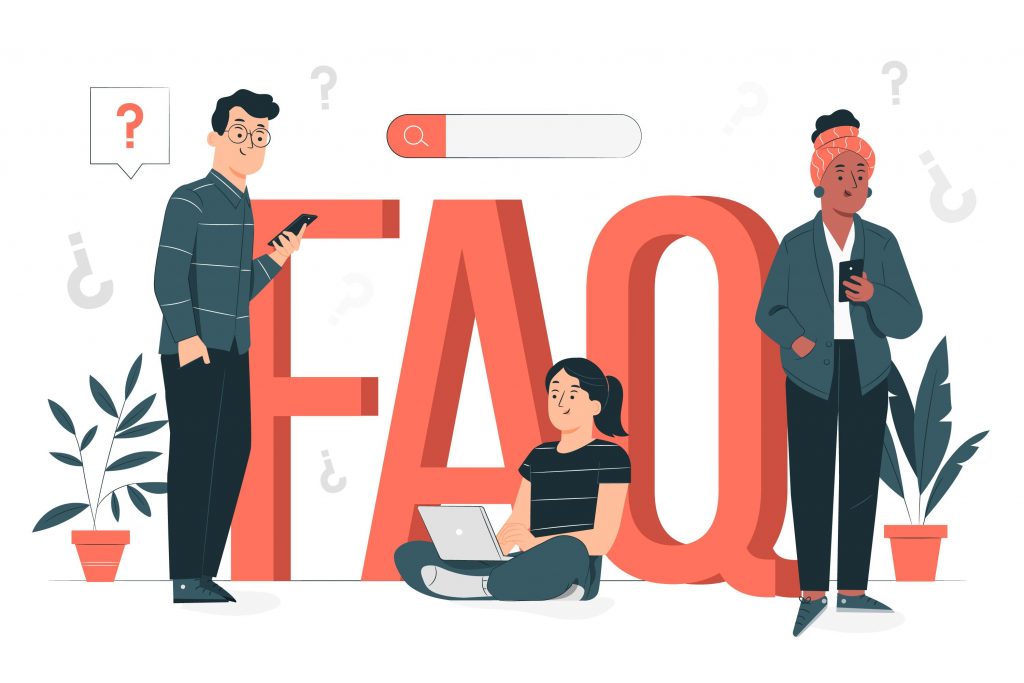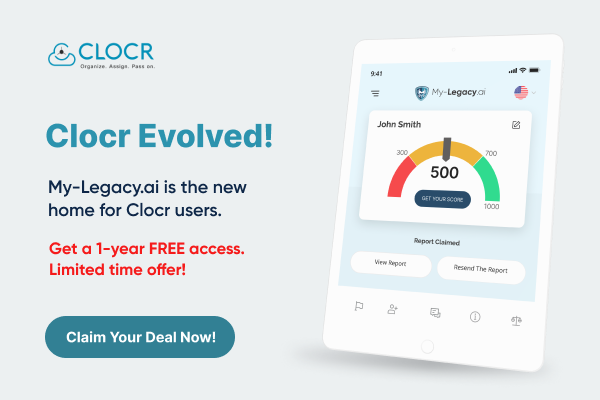Estate Planning is the process of arranging for management and disposal of a person’s assets and investments in the event the person becomes incapacitated or dies. Estates, as the assets and investments are jointly called, are transferred or passed down from one generation to another.
We are not new to the concept of Estate Planning. But, have you heard of the term Digital Estate Planning? What does it mean?
Digital Estate Planning is similar to Estate Planning; the main difference being instead of tangible or physical assets as in the case of Estate Planning, Digital Assets are transferred from one generation to the next.
Clocr’s Comprehensive Guide to Planning your Digital Estate
- What is a Digital Estate?
- What is Digital Estate Planning?
- Traditional Estate Planning vs Digital Estate Planning
- Why is Digital Estate Planning Important?
- What is the difference between Digital Estate Planning and Digital Assets?
- What happens to my Digital Assets if I do not include them in my Digital Estate Plan?
- How can a Digital Estate Plan protect my Digital Life?
- What happens if you don’t have a Digital Estate Plan?
- Who needs Digital Estate Planning?
- How to motivate yourself to start planning for your Digital Estate?
- How to Create a Digital Estate Plan?
- When should you update your Digital Estate Plan?
- Cryptocurrency and Digital Estate Planning
- Things to remember while creating a Digital Estate Plan
- Challenges and opportunities in managing a Digital Estate
- Digital Estate Planning in Various Countries
- Commonly asked Digital Estate Planning Questions
- Covid-Proofing your Digital Estate Plan
- Digital Estate Planning Issues
- Digital Estate Planning and Taxes
What is a Digital Estate?
A Digital Estate refers to electronic information assets that exist on the internet and devices. In other words, a Digital Estate comprises your online accounts and the electronic devices used to access these online accounts.
Your online accounts may include gaming profiles, bank services, third party payment services, social media accounts, cloud storage, online documents and cryptocurrency.
Electronic devices used to access this information include eBook readers, tablets, computers, laptops and smartphones.
What is Digital Estate Planning?
Digital Estate Planning is the process of organizing your Digital Assets (social media, online subscriptions, payment and other online accounts) and making arrangements for what should happen to them after your death.
Technology has vastly advanced in the past decade. With the availability of the internet to almost everyone on the planet, we have seen an increase in social media and other online account users. This growth is further fueled by the availability of affordable smartphones.
Digital Property is as important as any tangible or physical property. Have you wondered what happens to subscription or payment accounts of the deceased? How about social media accounts of the dead? Managing these Digital Assets has become a necessity as online accounts of the dead fall prey to hackers and frauds.
Traditional Estate Planning vs Digital Estate Planning
| Traditional Estate Planning | Digital Estate Planning |
|
|
Why is Digital Estate Planning Important?
If you still have doubts about why Digital Estate Planning is as important as Estate Planning for tangible assets, you are not alone.
Some part of our daily life involves using a digital account. It might be smartphones, laptops, music or eBook accounts, payment or other subscription accounts, personal websites and many more.
Have you heard of the term terror-management theory? Thinking of death or incapacitation turns the human mind to ‘defensive mode.’ No matter how hard the situation is, death is not an easy topic to discuss or talk about. Relatives or friends do not know how to talk about death to a dying person. Similarly, a dying person might find it uncomfortable to discuss their present feelings.
Advantages of Digital Estate Planning

Advantages of Digital Estate Planning include:
- Gives your beneficiaries an idea as to how to manage your online accounts
- Secures your online accounts from identity thefts and fraud.
- Helps your family members secure your Digital Legacy
- By making a list of your online accounts, you will have details of login names and passwords at one location, thus saving you time and energy spent in recovering accounts (forget password).
How does creating a Digital Estate Plan help my family after I'm gone?
Preparing for the worst situation and planning our estates – tangible and intangible – helps us and our loved ones during tough times. Don’t you think it would be easier for your next-of-kin if you had all your Digital Properties listed and included in a Will? Your next-of-kin will not have to fight long and tiring courtroom battles with service providers, trying to gain access to your photos, documents and other online documents after your passing.
What is the difference between Digital Estate Planning and Digital Assets?
Digital Assets are a collection of electronic information available on the internet or on devices. Your online accounts such as social media profiles, cloud storage, gaming profiles, shopping and subscription accounts, banking and third-party payment accounts and crypto wallets are collectively known as Digital Assets. The devices used to access these accounts also form a part of your Digital Assets.
Digital Estate Planning is the process of organizing your Digital Assets and making arrangements for what should happen to them after your death. Do you want your family members to download your important documents and photos from your cloud storage drive? Should they download all photos and close your social media profiles? Or, should they memorialize your social media profiles? What about subscription accounts? These are the decisions that go into your Digital Estate Planning document.
What happens to my Digital Assets if I do not include them in my Digital Estate Plan?
Do you know what happens to social media and online accounts after a user’s demise? Let’s consider a situation where a social media account user passes away unexpectedly. In a few months, their social media account is targeted by a hacker and their photos are made available on the public domain. The deceased user did not make any arrangements for their beneficiaries to handle their social media account. After the hack, the bereaved family members have to deal with their deceased loved one’s personal photos going public.
The above scenario is one example of identity theft. Imagine what would happen if the same extends to not just photos, but emails, payments and other online accounts?
Then there is the question of ‘How to include passwords and other sensitive information in a Will’. As you know, it is not legal to include passwords of your online accounts in your Will. Also, there comes an issue of privacy – your Wills go public after your death. You do not want everyone to know your passwords and security Q&As, do you?
Digital Estate Planning allows one to make arrangements on how to handle online accounts without declaring sensitive information in a Will or worrying about privacy concerns.
How can a Digital Estate Plan protect my Digital Life?

Creating a Digital Estate Plan for your Digital Assets helps in protecting your Digital Life.
- Unlike your household bills and property papers, your online life does not leave a paper trail. By creating an Estate Plan for your Digital Assets, you give your beneficiaries a digital trail of your Digital Property so that they can handle them effectively.
- By making an inventory of your online accounts and storing these details securely over cloud storage, you are protecting sensitive information (such as passwords) in your Will from going public.
- Your inventory of Digital Assets along with instructions for what should happen to each account can give your beneficiaries an easier way to handle your sensitive data.
What happens if you do not have a Digital Estate Plan?
Do you know what happens to your online accounts after your death? Every year, multiple unused online accounts of deceased users fall prey to hackers and identity thieves. When a user does not make arrangements to handle their online accounts, their family members have no way to secure their accounts after they are gone.
Social media influencers and those selling merchandise online have some amount of money in their online accounts. If they do not make arrangements to transfer their monetary gains, their beneficiaries will not be able to encash the profits after their loved one’s death.
Who needs Digital Estate Planning?
Digital Estate Planning for Senior Citizens
Most of the senior citizens are not aware of the fact that their online life and digital accounts are not included in a Traditional Estate Plan. Even if they want to include their online accounts in their Estate Plan, their next-of-kin might not be given complete access. Laws such as RUFADAA or UADAFA have made things simpler when it comes to Digital Estate Planning and handling of Digital Assets but people must be made aware of this new and upcoming trend in Estate Planning.
Digital Estate Planning for Millenials

A millennial might not want their family member(s) to access their social media profiles or go through their email conversations. By creating an Estate Plan for their Digital Assets and naming a Digital Executor of their choosing, they can avoid privacy concerns related to handling a deceased person’s online accounts.
You might be interested in reading:
Digital Estate Planning for Future Caregivers
A Digital Estate Plan gives caregivers a way to manage their incapictated loved one’s Digital Assets. This is only possible when an account holder makes arrangements on how to handle their digital accounts in case of death or incapacitation.
How to motivate yourself to start Planning for your Digital Estate?
The main reason people find it difficult to start a Digital Estate Plan is, they don’t want to think about their death. The second reason is the myth surrounding Estate Planning: it is tedious and time-consuming.
We are not going to lie about it – Estate Planning can be tiresome and time-consuming but think of the long-term benefits; think of how lost your family members might seem if you haven’t created an Estate Plan before death?
There is no doubt you have a lot of online accounts. Would you want them to be left unattended and an easy target for hackers after your death? Steps to motivate yourself and start planning for your Digital Estate:
- Use Digital Estate Planning tools
- Think of the benefits of creating an Estate Plan for your Digital Assets
- Remind yourself of how you want your Digital Afterlife to look like when you are no more.
- Ask for help
How to create a Digital Estate Plan?
Now that you know what a Digital Estate Plan is, you might be curious to learn how to create one.
Step 1: Identify and list your digital property
Step 2: Set up Legacy Contacts for those accounts which are to be memorialized or deleted after your death.
Step 3: Appoint a Digital Executor to manage your Digital Assets after your demise.
Step 4: Talk to an attorney and get your Digital Estate Plan legalized.
How do I set up a Digital Estate Plan?
The main purpose of creating a Digital Estate Plan is to make sure all your Digital Properties are identified, listed and arranged for your digital afterlife.
Digital Assets to include in your Digital Estate Plan are social media accounts (email ids +usernames), payment and subscription accounts ( PayPal, Amazon, Netflix ,Spotify, etc.), cryptocurrencies and cloud storage drives.
Reasons to create a Digital Estate Plan
- A way for next-of-kin to handle your online accounts after your demise.
- Some online accounts have sentimental value and your family members might want to hold on to those memories after you’re gone.
- Some online accounts have monetary values. By creating a Digital Estate Plan, you are making a way for your family members to receive monetary gains from your online accounts.
- Avoid identity theft
- Leave behind a Digital Legacy
When should you update your Digital Estate Plan?
If you have made an Estate Plan already, you would probably know you will have to revise and review it once in two or three years. The same holds good for Digital Estate Plans too. Internet Privacy Acts have forced social media and other online organizations to take measures. This means a frequent change in their privacy policies and terms & conditions.
Certain life events such as marriage, birth of a child, divorce, death of a loved one and sickness call for changes in your Digital Estate Plan.
Cryptocurrency and Digital Estate Planning
Did you know that Cryptocurrency also forms a part of your Digital Assets and you can include it in your Digital Estate Planning?
Hundreds and thousands of dollars worth Cryptocurrencies are going waste as the deceased user has not made provisions for their beneficiaries to access their crypto wallets. While making a Digital Assets inventory (first step of creating a Digital Estate Plan), make sure to add your Crypto wallet details and the electronic device used to buy cryptocurrency.
Things to remember while creating a Digital Estate Plan

Creating a Digital Estate Plan helps in securing your Digital Assets and Digital Legacy. The steps involved in creating a Digital Estate Plan include:
- Inventory of Digital Assets
- Leave instructions on how to manage your Digital Assets after your demise
- Appoint a Digital Executor
- Make your Digital Estate Plan legal.
Creating a Digital Estate Plan is a tedious task and you might miss out on a few things. Here are some points to remember while creating a Digital Estate Plan for your Digital Assets:
- Use an online password manager
- Appoint two Digital Executors
- Use an online estate planning tool
- Check legacy policies of organizations whose services you use (social media, cloud storage, payment, etc.)
- Review your Digital Estate Plan regularly
Challenges and Opportunities in managing a Digital Estate
Many are either unaware or not concerned about securing their Digital Legacy. They are not ready to discuss or address this issue further. Identity thefts are one of the main reasons to secure any Digital Account. Also, some Digital Accounts such as cloud storage drives and social media profiles hold sentimental value – photos, videos and such. By creating a Digital Estate for your Digital Assets, you are giving your family members a ‘digital’ way to remember you forever.
Recovering Digital Assets of a deceased or incapacitated loved one can be troublesome. Also, in the process of arranging and trying to organize all these assets, some will be lost forever. Hence, it is always advisable to create an Estate Plan for your Digital Assets and secure your Digital Afterlife.
Digital Estate Planning in Various Countries
Digital Estate Planning in the US
The Revised Uniform Fiduciary Access to Digital Assets Act (RUFADAA) is a law developed by Uniform Law Commission (ULC) to provide fiduciaries access to someone’s online accounts. The RUFADAA might provide a legal path for the fiduciaries to manage a deceased or incapacitated person’s accounts but it also provides privacy protection for the owners of the assets as well as those involved in making, storing or providing Digital Assets (collectively known as ‘custodians.’)
Digital Estate Planning in Canada
The Uniform Act on Fiduciary Access to Digital Assets (UAFADA) is a law developed by the Uniform Law Commission of Canada to provide fiduciaries access to someone’s online accounts. Unlike the ULC of the US, UAFADA provides default access to those fiduciaries who already have access to physical assets.
Digital Estate Planning in the UK
Unlike in the US and Canada, Digital Estate Planning in the UK is still in the development stage. For English Law purposes, digital records such as photos, videos and other documents are part of the device they were recorded in and are not considered as proprietary assets. Digital accounts such as social media and other online accounts are not considered as ‘assets in the normal sense’ as they do not hold any monetary value.
Commonly Asked Digital Estate Planning Questions

Is a list of passwords enough to create a Digital Estate Plan?
Leaving a list of usernames and passwords is not enough to be called a Digital Estate Plan as it leaves the beneficiaries with no information on what to do with these accounts. Also, it is not advisable to list your passwords and leave it for someone to find after you’re gone – this is a serious violation of privacy and ownership rights.
Use a password manager to store your usernames and passwords of all online accounts and make the master password available to your beneficiaries. Along with this, make a list of your online accounts and leave instructions on what should happen to them after your passing.
Is Digital Estate Planning more than just saving Facebook photos?
In short, yes.
Digital Estate Planning goes beyond saving Facebook photos or memorializing your Facebook profile after your death.
Digital Estate Planning allows you and your family members to manage your online accounts – including social media profiles, cloud storage, subscription services, gaming profiles and payment accounts – effectively.
What happens to my Digital Estate if I pass away?
Your family members or Digital Executor gains access to your Digital Assets after your death – only if you have created a Digital Estate Plan.
If you haven’t created a Digital Estate Plan, your family members will have to fight long courtroom battles with service providers to gain access to your Digital Assets such as photos, videos, social media profiles and perhaps even online payment services.
What do you mean by a Digital Executor?
A Digital Executor is someone who takes control of your Digital Assets after your demise.
If you want someone to handle your online accounts after you’re gone, you appoint a Digital Executor for your Digital Estate. You can leave instructions as to what they must do to your online accounts after your death.
Who owns your child’s Digital Assets?
Most minors do not own any significant properties and if they do, the default rule of intestacy law suggests their property will be inherited by their parents. But with the increase in the usage of the internet, a minor might own a significant amount of Digital Property.
Under the current law, minors have no right to decide what happens to their Digital Assets after death. Currently, the law has begun to address an adult’s succession rights to Digital Assets and hopefully in a couple of years, the same might be extended to minors too.
Covid-Proofing your Digital Estate Plan
Digitization of Estate Planning, though late to the market, has been picking up pace, especially since Covid19. Social distancing and complete lockdowns has necessitated the use of Digital Estate Planning tools.
Also, in times of uncertainty, it is always beneficial to be prepared for the worst. By creating a Digital Estate Plan using online tools, one can make a way for their loved ones to hold on to memories forever.
Digital Estate Planning Issues
Since Digital Estate Planning is a way for you to pass on your Digital Assets to your beneficiaries, the main issues faced include:
- Privacy and security concerns: You are giving your beneficiaries a way to access your Digital Life. The list of passwords falling into wrong hands is a serious concern. Also, if you are a millennial, you might not want your family members to access your chats and email conversations.
- Efficient transfer and management of your Digital Assets: How would you know if your Digital Executor has efficiently managed all your online accounts and acted as per your instructions?
Digital Estate Planning and Taxes
A Certified Public Accountant or CPA can help you in Traditional as well as Digital Estate Planning. When it comes to Digital Estate Planning, a CPA can:
- Help you understand the tax ramifications of your financial plans and help you maximize the amount of your Estate that is to be passed down to your beneficiaries.
- Help you understand the context of your Will and take into consideration any tax laws or regulations that might affect the transfer of your Digital Assets to your beneficiaries.
- Assist your Digital Executor understand the various tax processes and responsibilities involved in following your last wishes through your Will.

